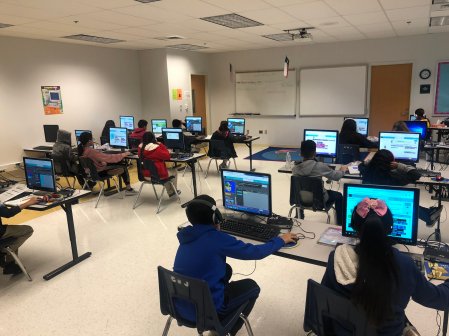Code.org, College Board expand computer science classes

In an effort to attract more female and minority students to Advanced Placement computer science, Code.org and College Board have partnered to develop curricula and prep materials for a new high school course that focuses on concepts beyond programming.
About 120 teachers are currently being trained to instruct AP Computer Science Principles, an experimentally minded class that exposes teens to big data, encryption and other Internet protocols – and how they can help solve some of society’s pressing problems.
The first assessment in the class will be administered during the 2016-17 school year.
Most teachers who enrolled in the 15-month pilot training program hail from major cities like New York, Chicago, Boston and Los Angeles. Some have never taught computer science before.
“We stepped up to the plate and are creating our own curriculum that is going to be available for free, regardless of district partnership,” Pat Yongpradit, vice president of education for Code.org, said.
Though the dozens of teachers kicked off their training in the new curriculum this week, the program will be available for free online through a Creative Commons license, which will also allow other instructors to adapt the material for their own classes.
The point, Yongpradit said, is to make the course as accessible as possible.
“AP Computer Science Principles was created in direct response to the horrible gender imbalance in ‘AP Computer Science A’ and in many courses,” he said in an interview with StateScoop, referring to the title of the existing AP class offering, which focuses on programming. “Broadening the view of computer science [beyond] just typing out commands on a computer – you’re appealing to a broader set of students.”
According to College Board, the overwhelming majority of students who take the existing AP computer science exams are white or Asian and male. About 20 percent of students who took the exam last year were female.
Among the high school graduating class of 2014 who took the PSAT, more than 165,000 female students demonstrated proficiency in AP computer science – but only 2.5 percent of them took the AP Computer Science A course and exam.
And according to analyses by Barbara Ericson, senior research scientist at Georgia Institute Technology, no black students took the programming exam in 13 states during the 2013-14 school year.
Ericson said Code.org will have a broad reach because its curriculum will be piloted in schools in urban areas.
“They’re testing in actual high schools and diverse high schools,” Ericson told StateScoop. “Sometimes things only get tested in high-end high schools. I think their development process is a good one.”
She added that unlike regular AP computer science – which focuses heavily on programming – the new course will also teach students about the global impact of computing.
“I think that will be very helpful in attracting more people to computing,” she said. “Women often think [computer science] is boring, antisocial, not creative, but if you can show them it actually is and has an impact on helping people, I think a lot more women will be interested.”
Though Brook Osborne, education program manager for Code.org, is heavily involved in the curriculum development process, she said she never had a role model for her passion.
She was the only girl in her high school AP computer science class in Ohio, and she passed with flying colors.
But, “I had no role models to identify myself with,” the 27-year-old said. “I never thought I was the kind of person who should do computer science, even though I demonstrated skill.”
She ended up majoring in economics at Duke University, but found her way back to her favorite subject when she started working at Code.org. She’s now in charge of developing the curriculum, which she said has more in common with AP studio art than with AP calculus.
AP Computer Science Principles “is going to be far more experimental, which is something you see in studio art,” she said. “You don’t learn by having someone tell you how to do art, you just do it. And I think a lot of people treat computer science as a lecture subject, and that’s not an effective way to learn things.”
Students will build skills and then will be expected to complete performance tasks demonstrating their ability, another concept used in studio art.
Osborne said she wants to help teachers learn to become facilitators rather than “holders of knowledge.”
“We’re thinking about how to let students tell the story of what they’re learning,” she said. “One of the most powerful things about Computer Science Principles is it’s trying to rethink how you capture student understanding. That’s a big task left to teachers.”






